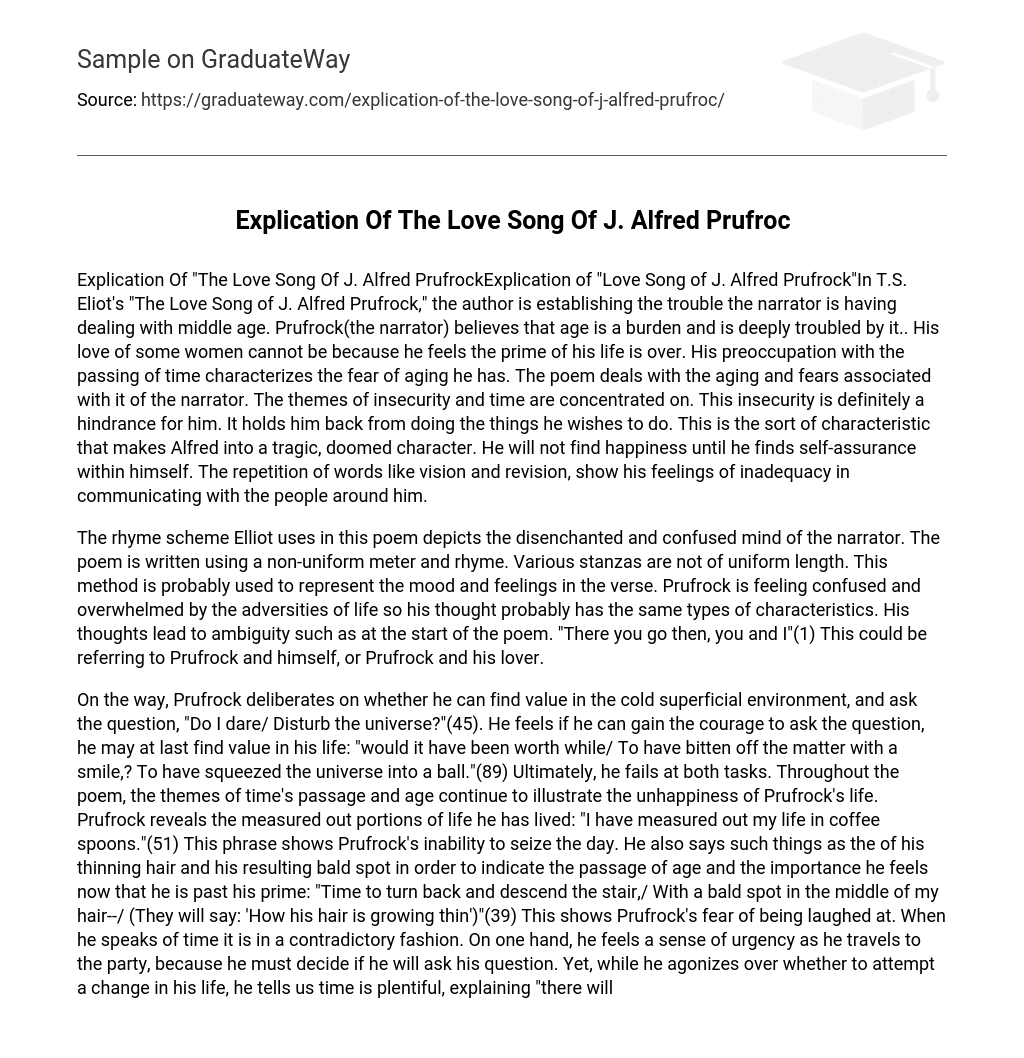In T.S. Eliot’s “The Love Song of J. Alfred Prufrock,” the author addresses the narrator’s struggle with middle age. Prufrock, the narrator, perceives age as a burden and experiences profound distress as a result. He is unable to fully embrace his love for certain women due to his conviction that his best years are behind him. The motif of time passing constantly occupies his thoughts and exemplifies his fear of growing old.
The poem focuses on the narrator’s fears and concerns about aging. Insecurity and the passage of time are central themes. This lack of confidence hinders him from pursuing his desires, making him a tragic and doomed character. Only by finding self-assurance will Alfred find happiness. The repetition of words like “vision” and “revision” emphasize his feelings of inadequacy in relating to others.
The use of a non-uniform meter and rhyme in Elliot’s poem reflects the disenchanted and confused state of mind of the narrator. The varying lengths of the stanzas are likely employed to convey the emotional atmosphere and sentiments within the verse. Prufrock, overwhelmed and confused by life’s challenges, likely experiences similar complexities in his thoughts. This uncertainty is exemplified at the beginning of the poem with the line “There you go then, you and I,” which could refer to Prufrock and himself, or Prufrock and his lover.
Prufrock contemplates whether he can find meaning in the cold superficial world and ponders if he has the courage to disturb the universe. He hopes that by asking this question, he will finally find value in his life, wondering if it would have been worth it to have faced life’s challenges with a smile and condensed the entire universe into a small ball. However, he fails in both endeavors. Throughout the poem, Prufrock’s discontent is evident through the themes of time’s passage and aging. He reveals that his life has been quantified in terms of coffee spoons.
This phrase demonstrates Prufrock’s incapacity to seize the day. He also mentions his thinning hair and resulting bald spot to signify the passing of time and the significance he now places on it: “Time to turn back and descend the stair,/ With a bald spot in the middle of my hair–/ (They will say: ‘How his hair is growing thin’)” (39). This demonstrates Prufrock’s fear of being mocked. When he discusses time, it is in a contradictory manner.
He experiences a sense of urgency as he journeys to the party, unsure if he should ask his question. However, even as he deliberates over making a change in his life, he assures us that there is an abundance of time, stating “there will be time for you and time for me/ And time yet for a hundred indecisions / And for a hundred visions and revisions/ Before taking of the toast and tea”(32).
This passage highlights Prufrock’s attempt to rationalize his fear of asking a question. It is ironic that despite conforming to societal expectations for years, Prufrock is oblivious to how time has also made him empty. He claims to have known everyone and everything, but in reality, he is unable to connect with anyone at the party.
As the scene plays out in his mind, he is left almost speechless by the intense scrutiny of the people who fix their gazes upon him. He describes this experience using vivid imagery, saying, “The eyes that fix you in a formulated phrase, and when I am formulated, sprawling on a pin, when I am pinned and wriggling on the wall, then how should I begin?”(56)
Prufrock is compared to a bug under the scrutiny of his peers, feeling pinned down and unable to ask his question. Despite being eager for his question to potentially change his life, he is plagued by self-consciousness and fear of not being understood. Concerned about being made a fool, he ultimately concludes that it’s not worth the effort. Prufrock’s fears in this line expose his innermost desires: “I am no prophet and here’s no great matter; And I have seen the eternal footman hold my coat, and snicker, And in short I was afraid.” (84)
The death symbolized by the eternal footman in this passage has been privy to their conversations for years, and he knows that only topics related to fashion, appearance, art, and style are considered worthy enough to be discussed. As a result of continuously listening, he has now become unable to hear their voices. Instead, all he can hear are “voices dying with a dying fall,” similar to the faint background music coming from a different room. Nevertheless, he is content with this situation because he and his world have returned to a comfortable state. Finally and permanently, Prufrock comes to terms with the fact that he will never attain the status of a prophet like Lazarus or a prince like Hamlet. Thus, he delves into the security of a fantasy world.





